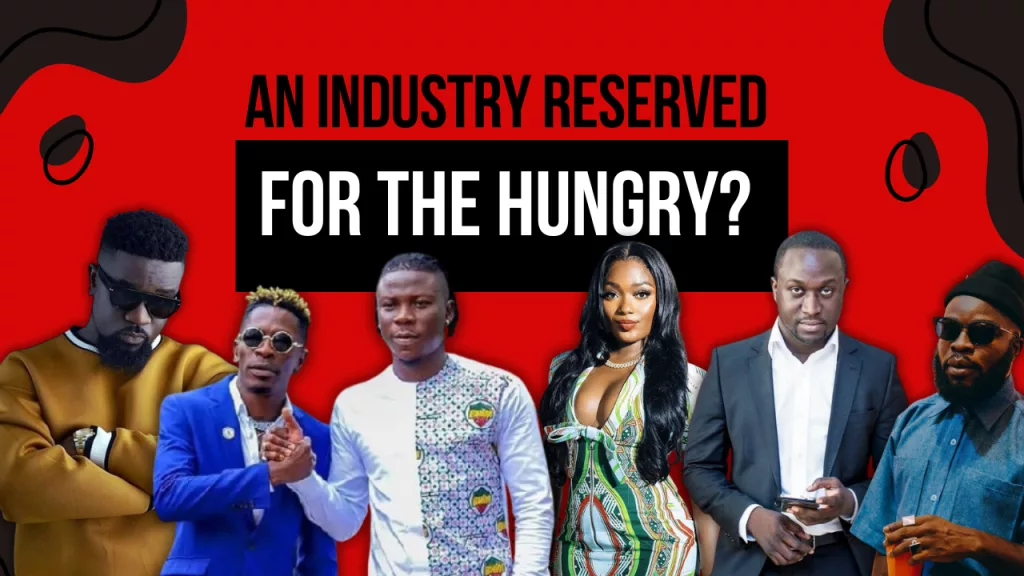The Ghanaian music industry like many others has its unique dynamics and there’s always been question marks about who stands a bigger chance to thrive. Is it a survival of the fittest or it’s a he who is hungry Thrives industry? A thought provoking question which continues to puzzle industry experts as both sides of the argument have a solid claim.
Whiles scrolling through my Facebook feed, I chanced upon a post from iconic music producer, Tubhani Duncan of Tubhani Musik which really caught my undivided attention. Duncan asked a critical question about some music acts who had all the industry backing and hype but still failed to make a breakthrough to the top. Whiles comments from followers kept flooding in.
I couldn’t help but laugh at some of the names mentioned because how on earth was the likes of Stonebwoy and Shatta Wale getting mentions here? I bet it’s all in a jovial way but there were some names that legitimately deserved to be mentioned.
I spotted a comment which had MANIFEST spelled out and in block capitals with an unimaginable amount of replies which pinched me to check these replies out. Followers shared their agreements and disagreements but one reply stood out,”The Ghanaian music industry is only for the hungry”
Most followers were in agreement of this assertion that indeed the music industry favors the hungry and Manifest was not just it as he had that Silver spoon in his mouth all along and barley struggled to kick start his music career.
For a Creative who is the son of one of the biggest and most popular law practitioners in the country what more could he strive for especially when he had all the connections and resources. Kwame Ametepee Tsikata’s Stanford education and network enabled him to clock international collaborations without haste and with less effort he was planted into the industry alongside acts who had to grind from the come up in sweat.
His debut album, “Manifestations” (2011), received critical acclaim. M.anifest’s subsequent albums, “Apae: The Price of Free” (2013) and “Nowhere Cool” (2016), showcased his unique blend of hip-hop and Afrobeat.
I can attest to the fact that Manifest never reached his expected potential despite the hype and industry backing. For a rapper who went toe to toe with the best and somewhat came out victorious, it’s a surprise he never made it to the level of his rival and competitor Sarkodie and this may solidify the claim that indeed the music industry of Ghana is one set up for the hungry to thrive.
Taking a look at Sarkodie who is regarded as the African rap god, we can be in favor of the notion. Born Michael Owusu Addo, Sarkodie rose from underground rap battles to become Ghana’s most successful rapper despite facing financial struggles, Sarkodie’s talent and determination earned him a record deal with Adasa Records and the rest they say, was history.
His debut album, “Makye” (2009), was a commercial success with subsequent albums, “Rapperholic” (2012) and “Mary” (2015), solidifying his position as a force to reckon on the African rap scenes earning him the title, African rap god.
Another Ghanaian music icon with similar background is Shatta Wale. Acclaimed as the African dancehall King, Charles Nii Armah Mensah Jr.’s journey from humble beginnings to dancehall stardom inspires millions. Shatta Wale’s early career was marked by struggles, but his breakthrough came with the hit single “Moko Hoo” (2004). He later formed the Bandana group, releasing the critically acclaimed album “Rastafari” (2005).
After a brief hiatus, Shatta Wale rebranded and released the hit song “Dancehall King”(2013) solidifying his name as an industry Guru and he’s been relevant since then having released several albums to his catalogue and cementing his name as one of the most decorated African musicians of all time.
Stonebwoy, whose real name is Livingstone Etse Satekla’s unique blend of dancehall and Afrobeat emerged from humble beginnings. Stonebwoy’s early career was shaped by his participation in the Ghanaian music competition, “Kasahare Level” (2008). He later joined Samini’s High Grade Family and released his debut album, “Grade 1” (2012). His subsequent albums, “Necessary Evil” (2014) and “Epistles of Mama” (2017), solidified his position as a leading African dancehall artiste and as of now, he’s regarded as a music icon not just in Ghana but Africa as a whole.
The started from the bottom now we here army stretches on with some going all the way to maintain their relevance whiles others may have fallen off due to some factors. Others however quit music to join other avenues after having attained their desires or somewhat meeting their targets.
Some honourable mentions may include the likes of Black Sherif who has gone ahead to establish himself as the digital Guru having racked up the most digital numbers on his music in the space of 4 years. Blacko as he is affectionately called looks to be the next in line for the crown of Ghana music having surpassed his predecessors in a short time span. Kuami Eugene and KIDI are names also worthy of notable mentions.
The two icons both started from their very humble beginnings and strived to get to the top. The both participated in the MTN hitmaker reality show where they excelled excellently and won themselves record deals to Richie Mensah’s Lynx entertainment. Legendary mentions goes to our highlife icons who made sure the set the path straight for the next generation to succeed. The likes of Daddy Lumba, Kojo Antwi, Amakye Dede, Ofori Amponsah can all boast of starting from the bottom to reach the top.
Taking a further look at the other side, there are still a host of artistes who had a headstart thanks to their affluent backgrounds aside Manifest and what says their fates? Efya whose real name is Jane Awindor’s well-educated background facilitated collaborations with global artists.
Efya’s early career was shaped by her participation in the Ghanaian reality TV show, “Stars of the Future” (2008). She later released her debut album, “The Best In Me” (2013), which featured international collaborations. Efya’s subsequent albums, “Janesis” (2015) and “Coming Up” (2017), solidified her position as a leading African soul singer and as of now, she regarded as one of if not the best vocalist in Ghana.
Efya somewhat fell off and never bothered to fight her way back to the top for reasons unknown. She’s tried to make a comeback to her old glory but that seems almost impossible as the industry has gotten even more competitive.
Another case is that of Joey B who came from a well to do family such that he was well connected to industry players and made a guest appearance on D-Black’s hit song “Vera” which projected him well enough to breakthrough with his subsequent singles which somewhat had big industry players making guest appearances.
Joey B made bangers with almost all the big names and experimented with several genres and even had one of the biggest songs of the azonto era “Tonga” but he never was at the top as in top of the league or even close. The list seems endless with the likes of Chase, Dee Money, J Town, Trigmatic and more making the list of the “Never Started from the bottom but now we here” army.
And if it was even noticed in the writeup, I excluded one particular individual and that is Richie Mensah, the CEO of Lynx entertainment and one of the greatest Ghanaian music producers ever. Richie started out as a singer and earned his place as a versatile artiste having collaborated with some top names and releasing some hot bangers of which “Frema” forever remains my favourite.

Richie came from a well to do background and had all the necessary backing from his family. His family even funded the establishment of his Lynx entertainment record label which to this day remains one of the biggest record labels in Africa alongside Marvins entertainment of Nigeria, Ambitious Entertainment of South Africa and YBNL of Nigeria.
Richie is always an exception despite being the head prefect of the “DBEE artistes” a popular slang for artistes coming from afluent backgrounds. He made good use of his connections and made the most out of it. Richie is the brain behind the buzzing careers of KIDI, Kuami Eugene, MzVee, Asem and many more A list artistes in Ghana.
He is the brains behind the iconic song “Simple” by Bradez, a song that has gone a long way to be the most remixed song in the history of Ghana music with the instrumentals being the standard beat for rap battles and freestyles in Ghana. Richie is also now a huge industry player and a board member of MUSIGA.
So back to the question of who can thrive in the Ghanaian music industry, there’s one thing worthy of notice that background shouldn’t even be a factor to determine how successful one may be in the music industry. The Ghanaian music industry presents opportunities and challenges for artists from diverse backgrounds and that’s the simple truth as many from both sides have failed and succeeded in the past.
The likes of Sarkodie, Shatta Wale, and Stonebwoy have risen from humble beginnings where their struggles and hardships have fueled their music, infusing it with authenticity and relatability. This “struggle narrative” has become a hallmark of Ghanaian music, resonating deeply with listeners.
Artists from disadvantaged backgrounds often possess a stronger drive to succeed. Music provides an escape from poverty, and their hunger for success propels them to work tirelessly. This grit and determination can lead to more innovative and passionate music.
Moreover, artists from humble backgrounds tend to maintain a strong connection with their grassroots audience. By performing at local events and gigs, they build a loyal fanbase that appreciates their raw talent.
On the other hand, artists from affluent backgrounds enjoy significant advantages. Access to quality education, training, and industry connections can provide a solid foundation for success. Financial backing from wealthy families allows artists to focus on their craft without immediate financial pressures.
Networking opportunities, facilitated by well-connected families, can introduce artists to industry professionals, producers, and promoters. Exposure through international collaborations and marketing can also catapult them to stardom. However, artists from rich backgrounds face unique challenges. Listeners may perceive them as “privileged” or “not authentic,” making it harder to connect with the masses. Family expectations or social status can lead to creative constraints, stifling their artistic expression.
Without a grassroots connection, they may struggle to establish street credibility, essential for success in the Ghanaian music industry. While there are valid points on both sides, it’s clear that success in the Ghanaian music industry is not exclusively reserved for hungry artists from humble backgrounds. What’s your thoughts too?

